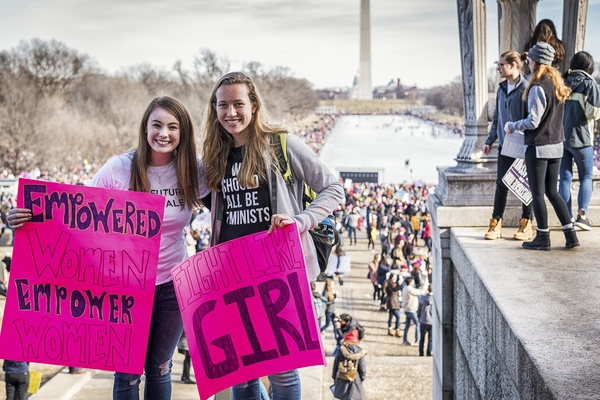Thousands of Women Gather at the Texas Capitol to Protest New Abortion Ban

Women attend marches around the country to advocate for rights.
October 28, 2021
The Texas Heartbeat Act was signed into law on May 19th, 2021 and took effect on September 1st, 2021. This law bans abortions after an ultrasound has detected a heartbeat. This could be as early as six weeks where some women do not know that they are pregnant. Some people are angry because there are no exceptions for rape or incest. But, there is an exception for medical emergencies.
Since the law has gone into effect, there have been several marches held by women across the country to protest. On October 2nd, 2021 thousands of citizens gathered on the Texas Capitol’s south lawn to protest this bill. The march was organized by Women’s March ATX, a group that promotes workers rights, LGBTQIA rights, and women’s rights. There were also hundreds of other marches planned across the country that day. But not everyone in attendance was on the same side. Around thirty counter-protesters were there according to officials from the Department of Public Safety.
Pamela Bryant, founder of Walk by Faith Prison Ministry, said, “I don’t think (lawmakers) understand each individuals situation. They’re not seeing it from how it can impact other people.” Walk By Faith is a religious organization that goes to prisons and gives testimonies on how to better your life after prison. This bill is a major concern for her because she works closely with the homeless population and is worried how this will effect the women she cares for.
This is not the first time the issue of abortion has been brought to court. In 1829, New York criminalized abortions by making pre-quickening abortions a misdemeanor and post-quickening abortions a felony. Almost two decades later, New York then passed a law saying that any women who gets an abortion could serve anywhere from three months to a year in prison. It was also illegal to sell abortion inducing medication.
Then, in 1970, New York legalizes abortion up until the 24th week of pregnancy. It was required that it was done by a licensed medical professional. In 1971 New York repealed the law saying that inducing an abortion was a criminal offense.
In 1973, one of the most popular abortion cases, Roe v. Wade was passed. This ruled that The United States Constitution protects a women’s choice to have an abortion without government restriction. The Reproductive Rights Act was passed in New York which allowed for abortions past the 24th week of pregnancy if the mother is in good health.
Bills like this have been considered in other states like Ohio, Georgia, Louisiana, Missouri, Alabama, Kentucky, and South Carolina. But the women that attended these marches hope that they showed enough passion to make a difference.

